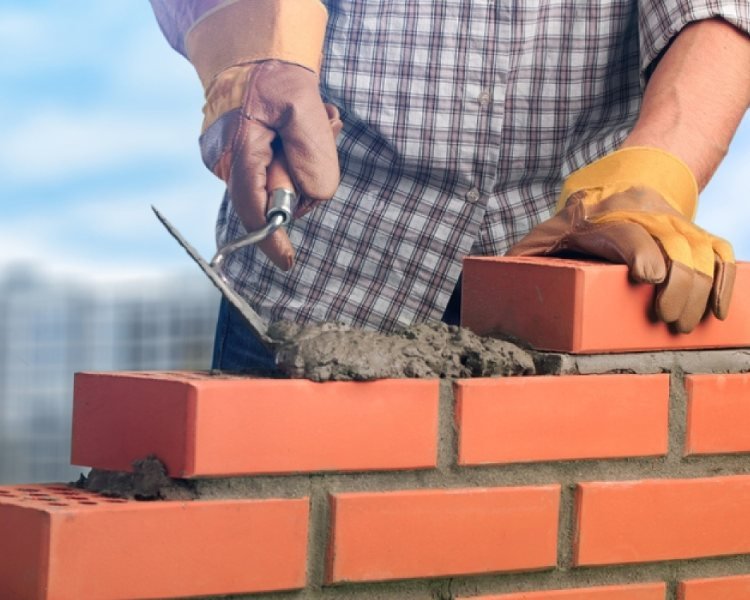Opening the Tricks of Sustainable Stonework Building And Construction Practices for Eco-Friendly Buildings
Amongst the myriad strategies to environmentally friendly building, sustainable masonry building stands out as a time-tested and resilient method that holds a riches of untapped possibility. From the selection of materials to ingenious building and construction methods, the secrets to attaining sustainability within masonry construction are diverse and intriguing.
Benefits of Lasting Masonry Construction
Embracing sustainable masonry building and construction methods not only minimizes ecological effect but also uses long-term economic benefits to builders and neighborhoods. By using materials like recycled bricks, blocks, and rocks, contractors can substantially decrease the carbon footprint of their projects while advertising resource efficiency. Furthermore, sustainable stonework building techniques, such as appropriate insulation and thermal mass properties, can improve power performance within buildings, leading to decreased functional expenses with time.
Furthermore, the toughness and durability of masonry structures contribute to long-term economic advantages. Buildings created making use of lasting masonry methods frequently call for less upkeep and fixing, equating to cost financial savings for contractors and home owners. The long life of stonework materials likewise guarantees that frameworks continue to be stable and safe and secure, decreasing the demand for constant remodellings or replacements.
Eco-Friendly Stonework Products
Utilizing green masonry materials is a pivotal step in the direction of boosting the sustainability of construction methods and minimizing ecological impact while maximizing lasting economic benefits. Lasting masonry products are sourced, generated, and utilized in a fashion that lowers general ecological effect. Lasting concrete blocks incorporate recycled accumulations and might feature improved insulation homes, adding to energy performance in structures.
Moreover, all-natural materials like adobe, rammed planet, and straw bales give outstanding thermal mass homes, decreasing the need for home heating and cooling down energy. These products are frequently locally available, promoting regional economies and lowering transportation-related carbon exhausts. By choosing environmentally friendly stonework products, building and construction jobs can substantially lower their environmental impact and add to the production of healthier, more sustainable built environments.
Energy-Efficient Stonework Methods
Power efficiency plays an important duty in boosting the sustainability of stonework construction practices. By executing energy-efficient stonework strategies, builders can considerably minimize the total power usage of a building, causing lower operational costs and a smaller environmental impact. One vital energy-efficient masonry method is using thermal mass, which entails including thick materials like concrete or block right into the structure's structure to soak up and store warm. This aids regulate interior temperatures, minimizing the demand for mechanical home heating and cooling down systems.

Developments in Sustainable Stonework
Current innovations in lasting masonry methods have caused innovative methods that are reshaping the building industry. One such development is the development of self-healing concrete, which makes use of germs embedded within the concrete to heal fractures autonomously. This advancement not just minimizes maintenance prices but likewise improves the resilience of masonry frameworks, adding to their sustainability.
One more remarkable development is making use of recycled accumulations in masonry building - masonry contractor. By including materials such as smashed ceramic waste or recycled glass into concrete mixes, builders can reduce the ecological influence of construction jobs while preserving structural integrity. This technique not only diverts waste from garbage dumps yet additionally preserves natural deposits, making it a key advancement in lasting stonework building and construction
Additionally, the combination of electronic style tools, such as Building Info Modeling (BIM), is changing the way stonework structures are prepared and created. BIM permits more precise estimations, decreased material waste, and boosted energy performance, ultimately leading to even more lasting structure methods. These innovations collectively indicate an encouraging future for sustainable stonework building in the age of eco-friendly structures.
Future Trends in Stonework Sustainability
With the ingenious strides made in sustainable masonry techniques, the future trends in masonry sustainability are poised to additional transform the construction industry. One of the crucial patterns forming the future of masonry sustainability is the boosted combination of innovation. Improvements such as Building Details Modeling (BIM) and virtual truth simulations are being utilized to enhance stonework construction processes, leading to decreased material waste and enhanced power effectiveness in buildings.
Moreover, the advancement of unique sustainable products is readied to play a considerable role in improving the eco-friendliness of masonry building and construction. masonry contractor. Advancements like self-healing concrete, recycled accumulations, and bio-based binders are obtaining grip for their ability to minimize environmental impact while preserving structural honesty

Conclusion
Finally, sustainable stonework building and construction practices supply various advantages for environment-friendly buildings. By making use of eco-friendly materials and energy-efficient methods, masonry can add to an extra lasting developed atmosphere. Innovations in lasting stonework are constantly being created to even more boost the environmental performance of buildings. Looking in the direction of the future, the fad of masonry sustainability is anticipated to expand, resulting in even more eco friendly and energy-efficient building techniques in the years to find.